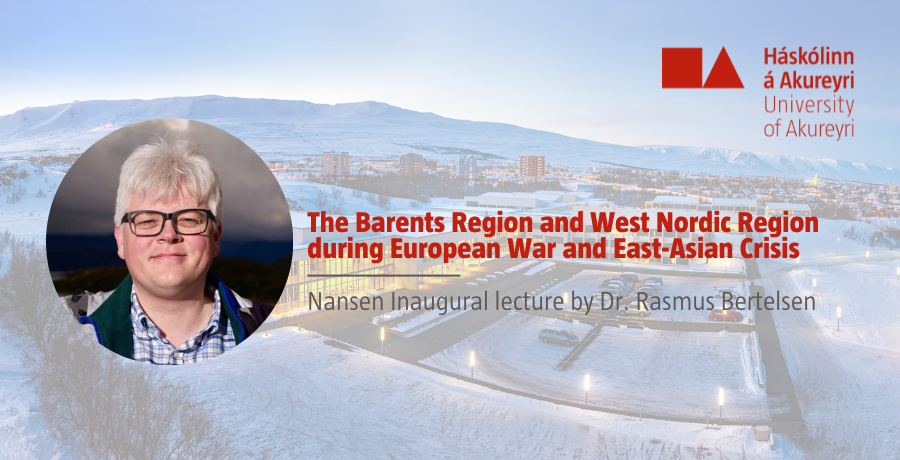- Study
- Student
- Research
- About UNAK
- University
- Schools & faculties
- Governance
- Rector
- Rector’s Office
- University Council
- University Assembly
- University Office
- Laws and regulations
- Organization
- Code of Ethics
- Councils and committees
- Strategies & policies
- On campus
- Human resource
The Barents Region and West Nordic Region during European War and East-Asian Crisis
10. October 2022 at 13:00-15:00
Nansen Inaugural lecture by Dr. Rasmus Bertelsen
On Monday, October 10th, will Nansen Inaugural lecture by Dr. Rasmus Bertelsen take place at the University of Akureyri in room M102 and in stream
Program
13:00 Opening Remarks
Dr Eyjólfur Guðmundsson, Rector of the University of Akureyri
13:10 Introduction to the Discussion
Dr Gunnar Rekvig, Associate Professor—Northern Studies | UiT the Arctic University of Norway, Nansen Professor 2021
13:20 The Barents Region and West Nordic Region during European War and East-Asian Crisis
Dr Rasmus Bertelsen, Nansen Professor 2022, Professor of Northern Studies, Barents Chair in Politics | UiT the Arctic University of Norway
Abstract
The Barents Region and the West Nordic have for centuries been strongly influenced by international political, economic, security and technological developments. The Arctic reflects the international system. The bipolar Cold War Arctic was divided between Nordic/North American and Soviet Arctic, while post-Cold War US unipolarity and hegemony allowed for a liberal Circumpolar Arctic with the Arctic Council, International Arctic Science Committee, University of the Arctic, Barents Cooperation, etc. Today, the return of China as one of the world’s largest economies and of Russia as a traditional Eurasian great power drive Sino-US confrontation in East Asia and US-Russian confrontation in Europe. These shifts significantly affect the Arctic, and the Barents Region and West-Nordic Region. The US excludes Chinese investment and science from the Nordic and North American Arctic. China focuses large investments on the Russian Arctic. The A7 have paused Arctic Council work and largely severed economic, scientific, and other Arctic ties to Russia in response to Russia’s invasion of Ukraine. The Barents and West Nordic regions must navigate these immediate circumstances and long-term developments in international order for their political and socio-economic development.
13:50 Comments
14:10 Q&A
Reception
